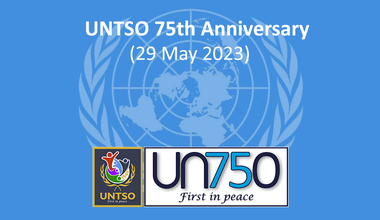In November 1947, the United Nations General Assembly endorsed a plan for the partition of Palestine, providing for the creation of an Arab State and a Jewish State, with Jerusalem to be placed under international status. The plan was not accepted by the Palestinian Arabs and Arab States. On 14 May 1948, the United Kingdom relinquished its mandate over Palestine and the State of Israel was proclaimed. On the following day, the Palestinian Arabs, assisted by Arab States, opened hostilities against Israel.
On 29 May 1948, the Security Council, in resolution 50 (1948), called for a cessation of hostilities in Palestine and decided that the truce should be supervised by the UN Mediator, with the assistance of a group of military observers. The first group of military observers, became known as the United Nations Truce Supervision Organization (UNTSO), established in 1949 to supervise implementation of the Israel-Arab Armistice Agreements. UNTSO Military Observers remain in the Middle East to monitor ceasefires, supervise armistice agreements, prevent isolated incidents from escalating and assist other United Nations peacekeeping operations in the region.
Following the wars of 1956, 1967 and 1973, the functions of the observers changed in the light of changing circumstances, but they remained in the area, acting as go-betweens for the hostile parties and as the means by which isolated incidents could be contained and prevented from escalating into major conflicts.
UNTSO personnel have also been available at short notice to form the nucleus of other peacekeeping operations on a temporary basis. The ability of UNTSO military observers to deploy after the Security Council acted to establish a new operation has been an important factor contributing to the initial effectiveness of such missions.
In the Middle East, groups of UNTSO military observers are today attached to the peacekeeping forces in the area: the United Nations Disengagement Observer Force (UNDOF) on the Golan and the United Nations Interim Force in Lebanon (UNIFIL). In addition, UNTSO maintains its headquarters (HQ) in Jerusalem and its liaison offices in Beirut (Lebanon), Cairo (Egypt) and Damascus (Syria). The liaison offices for Israel and Jordan are based at the HQ in Jerusalem. The Liaison Offices Beirut, Damascus, Cairo and Amman/Tel Aviv coordinate the regional liaison visits of the Head of Mission / Chief of Staff and Senior Advisor to Lebanon, Syria, Egypt, Jordan and Israel respectively. Liaison Office Cairo also conducts patrols on the Sinai Peninsula.
The UNTSO Liaison Offices throughout the mandate area engage regularly with national officers in the respective countries to review stability/security trends and effects, as well as with troop-contributing countries, international representatives, and regional UN organizations.
 UN
UN United Nations Peacekeeping
United Nations Peacekeeping

